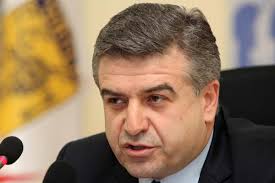 By Sara Khojoyan and Anthony Halpin
By Sara Khojoyan and Anthony Halpin
YEREVAN (Bloomberg) — Armenia’s new prime minister has what he believes is a vote-winning message before parliamentary elections in May: The economy’s in terrible shape and he’s the man to fix it.
The impoverished ex-Soviet republic needs “profound change,” Karen Karapetyan, who took office in September, said in an interview in the capital, Yerevan, on Saturday, November 19. “We’re proposing the most rapid change that’s possible,” including measures to combat corruption by streamlining bureaucracy and a government fund to support enterprise, he said.
“Businesses shouldn’t be obstructed” by corrupt officials seeking payments for administrative decisions or by dominant rivals using political ties to restrict competition, said Karapetyan, a former mayor of Yerevan who took office after returning from Russia, where he worked in Moscow since 2012 for a subsidiary of Gazprom PJSC, the world’s largest natural-gas exporter. “We will create an even, competitive, level playing field.”
Armenian President Serzh Sargsyan called the new premier a “symbol of change” when he named him to replace Hovik Abrahamyan. The economy’s in an “extremely bad” state and needs “structural” overhaul, Karapetyan told lawmakers next day. Sargsyan made the change after thousands joined street protests in July in support of armed men who took hostages at a Yerevan police station and demanded the president’s resignation.
The Caucasus nation of three million people is reeling from the impact of the recession in Russia, its main export market, as well as a slump in remittances from Armenians working in that country.









